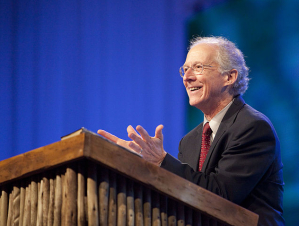Theologian John Piper has shared a biblical perspective on interracial dating and marriage, arguing that Christians should "celebrate the unity of a godly, Christ-exalting man and woman who are marrying in the Lord across racial lines".
Piper, who serves as the chancellor of Bethlehem College & Seminary in Minnesota and founder/teacher of DesiringGod.org, wrote in a recent blog post that he receives a "surprising" number of questions on interracial marriage, and said such questions need to be taken seriously. In fact, he revealed that growing up, he was taught to believe the opposition to interracial marriage was grounded in Scripture. In a 2005 blog post, Piper admitted that he was, at the time, a "southern teenage racist".
"I think it was the origin of most of my deplorable attitudes towards other races in those days. I wasn't just taught that it was a sin; I believed it was a sin," he writes. "So, I don't take this struggle lightly."
And he's not alone: A Pew Research Center poll released in February 2012 found that in 2010, 15 percent of all new marriages in the U.S. were between spouses of different races or ethnicities, compared to 6.7 percent in 1980. While more than four-in-ten Americans (43%) say that more people of different races marrying each other has been a change for the better in our society, 11% say it has been a change for the worse.

In his blog post, Piper, who advocates for interracial marriage in his book Bloodlines, points to several Bible verses that support interracial marriage. He discusses how all races have one ancestor; how in Jesus Christ God is creating "a new race"; how the Bible forbids intermarriage between believer and unbeliever - not between members of different ethnic groups; and how, in the Old Testament, God punished Moses' sister for opposing his marriage to a black woman.
"Being human in God's image compared to any racial distinction is ten million to one in terms of importance," he explains. "In Christ, ethnic and social differences cease to be obstacles to deep, personal, intimate fellowship...To make racial and ethnic distinctions decisive in relations is to oppose the truth of what God is creating in Christ."
Pointing to Deuteronomy 7:3-4, Piper argues that the Bible forbids intermarriage between believer and unbeliever, not between members of different ethnic groups: "If you want to talk about a prohibition of interracial marriage, then let it be the biblical talk about the prohibition of marrying outside the Christian race," he says.
Finally, Piper points to Numbers 12:10, where God strikes Miriam with leprosy after she criticizes the marriage of her brother, Moses, to an Ethiopian woman.
"At least we know from this story that God is not pleased with Miriam's criticism of Moses's marriage to a black woman, and there is no other criticism of it," he writes.
"I think it is right to not simply permit or tolerate, but to celebrate the marriage of a godly, Christ-exalting man and woman who are marrying in the Lord across racial lines," he concludes. "It will not destroy like that quote from the letter says it would. It will not destroy any God-appointed diversity in the world. It will, in fact, feature that diversity and the power of Christ in it."
In an earlier blog post addressing racial harmony, Piper argued that opposition to interracial marriage is "one of the deepest roots of racial distance, disrespect, and hostility".
"And as long as we disapprove of it, we will be pushing our children, and therefore ourselves, away from each other," he wrote. "The effect of that is not harmony, not respect, and not equality of opportunity. Where racial intermarriage is disapproved, the culture with money and power will always dominate and always oppress.
Christ does not call us to a prudent life, but to a God-centered, Christ-exalting, justice-advancing, counter-cultural, risk-taking life of love and courage. Will it be harder to be married to another race, and will it be harder for the kids? Maybe. Maybe not. But since when is that the way a Christian thinks? Life is hard. And the more you love the harder it gets."







